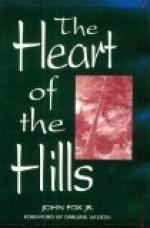“That boy’s a-goin’ to bust loose some day,” said one voice. “I’ve heerd him a-shootin’ at a tree every day for a month up thar above his corn-field.”
“Oh, no, he ain’t,” said the other. “He’s just gittin’ ready fer the man who shot his daddy.”
“Well, who the hell was the feller?”
The other man laughed, lowered his voice, and the heart of the listening lad thumped painfully against the bowlder under him.
“Well, I hain’t nuver told hit afore, but I seed with my own eyes a feller sneakin’ outen the bushes ten minutes atter the shot was fired, an’ hit was Babe Honeycutt.”
A low whistle followed and the two rode on. The pheasant squatted to his limb undisturbed, and the lad lay gripping the bowlder with both hands. He rose presently, his face sick but resolute, slipped down into the road, and, swaying his head with rage, started up the hill toward the Honeycutt cove. On top of the hill the road made a sharp curve and around that curve, as fate would have it, slouched the giant figure of his mother’s brother. Babe shouted pleasantly, stopped in sheer amazement when he saw Jason whip his revolver from his holster, and, with no movement to draw his own, leaped for the bushes. Coolly the lad levelled, and when his pistol spoke, Babe’s mighty arms flew above his head and the boy heard his heavy body crash down into the undergrowth. In the terrible stillness that followed the boy stood shaking in his tracks—stood until he heard the clatter of horses’ hoofs in the creek-bed far below. The two Honeycutts had heard the shot, they were coming back to see what the matter was, and Jason sped as if winged back down the creek. He had broken the truce, his grandfather would be in a rage, the Honeycutts would be after him, and those hills were no place for him. So all that day and through all that night he fled for the big settlements of the Blue-grass and but half consciously toward his mother and Mavis Hawn. The fact that Babe was his mother’s brother weighed on his mind but little, for the webs of kinship get strangely tangled in a mountain feud and his mother could not and would not blame him. Nor was there remorse or even regret in his heart, but rather the peace of an oath fulfilled—a duty done.




